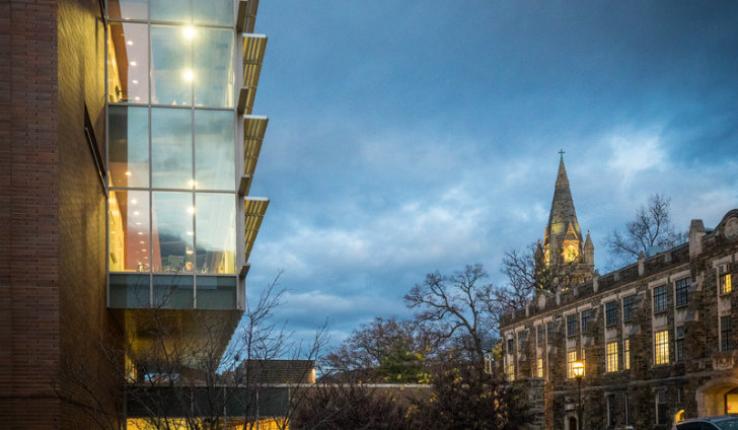Ari Berman: ‘Are We Going to Allow Voter Suppression?’

Voting rights expert Ari Berman talks with a student before Tuesday's talk.
Journalist and voting rights expert Ari Berman delivered a grim assessment of current efforts to restrict voting rights and access to the ballot in a one-hour talk Tuesday titled “Reclaiming Your Voting Rights.” Berman told those assembled in Packard Auditorium for the third MLK Committee-sponsored event of the academic year that the only promising development is increased awareness through media attention.
Part of that is due to a host of brazen efforts to restrict voting rights that came in the wake of the controversial 2013 decision by the Supreme Court to eliminate key provisions of the 1965 Voting Rights Act that was signed into law by President Lyndon Johnson. The Voting Rights Act—long considered one of the crowning achievements of the civil rights movement—came after years of effort led by Rev. Dr. Martin Luther King, who gave his first major speech on voting rights in 1957 at the Prayer Pilgrimage for Freedom, a precursor to the March on Washington led by King.
“Martin Luther King had a tremendous influence on my life and my work,” said Berman, who wrote the critically acclaimed Give Us the Ballot: The Modern Struggle for Voting Rights and frequently writes about civil rights for several publications and offers commentary for MSNBC and NPR.
Berman conceded that voting rights was almost an abstract concept to him, until he witnessed the intense activity across the country to implement more restrictive voting laws after the 2010 election. All told, he said, “half the states in the country changed election laws to make it more difficult to vote.”
Many of these efforts, he said, were aimed at college students or people of color. And, with the U.S. Supreme Court decision that removed protections from discriminatory voting practices, the activity increased, resulting in the passage of sweeping restrictions on voting rights in many states, he said. South Carolina, for example, dramatically rewrote voting laws within a month of the decision, in an effort that a high court later found targeted African Americans “with almost surgical precision.”
Other state-sponsored efforts included implementing restrictive voter ID laws, reducing or eliminating early voting, purging voter rolls for various reasons and eliminating polling places. In Dodge City, Kansas, for example, the predominantly Hispanic electorate had one polling place to serve 27,000 people. “And now they just moved it one mile further from the closest bus stop,” Berman said, noting that the Secretary of State who controls voting is Kris Kobach, the Republican candidate for Kansas governor in the upcoming midterm elections.
In North Dakota, a new law now mandates that voters have a street address. This decision, Berman said, presents a distinct disadvantage for the state’s considerable Native American population that resides on rural tribal reservations that don’t have street addresses. In Georgia, a closely contested race for governor has seen many efforts to purge voter rolls and reject absentee ballots, potentially disenfranchising tens of thousands of voters.
It is ironic, he noted, that the efforts are justified by claims of widespread voter fraud. “It is actually a very rare problem in the United States,” he said. “Actual voter impersonation is so rare that a recent study that examined all the votes cast between 2000 and 2014 found only 31 cases. It is such a small percentage that you actually can’t do it on your calculator. What has happened is that the laws in response to alleged fraud have prevented far more people from voting.”
Easily hackable voting systems present an additional concern, with many states—including Pennsylvania —still employing outdated and vulnerable machines with no paper ballot. “It’s crazy in this day and age to have people voting on machines that cannot guarantee, with 100 percent certainty, that nothing has been manipulated,” he said.
Those distressing developments are balanced by the fact that awareness of voting issues is growing, and many states are responding by expanding voting rights through ballot initiatives. In Florida, for example, a ballot initiative in the upcoming election has the potential to restore the voting rights of 1.4 million former felons. The initiative needs 60 percent of the vote to pass, and is currently polling at 75 percent, Berman said.
An additional 14 states have same-day registration for voting and several more have already passed automatic registrations, following Oregon’s lead.
“We have a lot of very good ideas,” Berman said. “We know what works. All we are lacking is the political will to implement them.”
The upcoming midterm elections present an inflection point, he said. “State races really matter. It is the state legislators who pass these restrictive laws. It is the secretaries of state who are enforcing them. Republicans understood this after they lost the White House in 2008, and came back in 2010 to gain all this power on the state level.
“We have to decide as a country: Are we going to allow voter suppression?” he asked. “Is this going to be the new norm? Or are we going to move in a different direction? I’m worried we will choose disenfranchisement, but I’m also hopeful that we can take a different path forward.”
Following his talk, Berman fielded questions from the audience on the Electoral College, efforts to encourage greater voter participation, and successful approaches employed by other countries. “In Australia,” he said, “voting is mandatory. The U.S. ranks 31st out of 34th in voter turnout. By any measure, we are failing in our approach.”
Photos by Christa Neu
Posted on:





